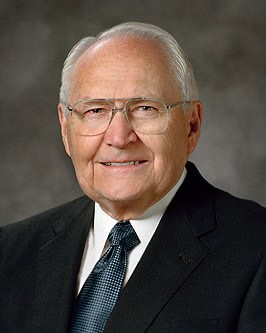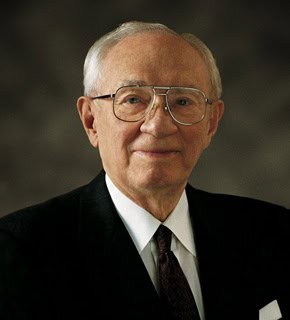SEARCH BY TITLE
 Let Him Do It with Simplicity
Let Him Do It with Simplicity
We have been encouraged at almost every general conference of the Church I can remember not to live beyond our means. Our income should determine the kind of housing we can afford, not the neighbor’s big home across the street. President Heber J. Grant once said: “From my earliest recollections, from the days of Brigham Young until now, I have listened to men standing in the pulpit … urging the people not to run into debt; and I believe that the great majority of all our troubles today is caused through the failure to carry out that counsel”. One of the better ways to simplify our lives is to follow the counsel we have so often received to live within our income, stay out of debt, and save for a rainy day. We should practice and increase our habits of thrift, industry, economy, and frugality. Members of a well-managed family do not pay interest; they earn it.
 To the Boys and the Men
To the Boys and the Men
Everyone knows that every dollar borrowed carries with it the penalty of paying interest. When money cannot be repaid, then bankruptcy follows. There were 1,350,118 bankruptcies in the United States last year. This represented a 50 percent increase from 1992. In the second quarter of this year, nearly 362,000 persons filed for bankruptcy, a record number for a three-month period. We are beguiled by seductive advertising. Television carries the enticing invitation to borrow up to 125 percent of the value of one’s home. But no mention is made of interest. President J. Reuben Clark Jr., in the priesthood meeting of the conference in 1938, said from this pulpit: “Once in debt, interest is your companion every minute of the day and night; you cannot shun it or slip away from it; you cannot dismiss it; it yields neither to entreaties, demands, or orders; and whenever you get in its way or cross its course or fail to meet its demands, it crushes you”. I recognize that it may be necessary to borrow to get a home, of course. But let us buy a home that we can afford and thus ease the payments which will constantly hang over our heads without mercy or respite for as long as 30 years. No one knows when emergencies will strike. . . Since the beginnings of the Church, the Lord has spoken on this matter of debt. To Martin Harris through revelation, He said: “Pay the debt thou hast contracted with the printer. Release thyself from bondage” (D&C 19:35). President Heber J. Grant spoke repeatedly on this matter from this pulpit. He said: “If there is any one thing that will bring peace and contentment into the human heart, and into the family, it is to live within our means. And if there is any one thing that is grinding and discouraging and disheartening, it is to have debts and obligations that one cannot meet”. We are carrying a message of self-reliance throughout the Church. Self-reliance cannot obtain when there is serious debt hanging over a household. One has neither independence nor freedom from bondage when he is obligated to others.
 Welfare Responsibilities of the Priesthood Quorums
Welfare Responsibilities of the Priesthood Quorums
I should like to tell you of an experience I had many years ago while serving as a stake president. I received a telephone call from a bishop who reported that a husband and wife in his ward were seeking a divorce. Having gone beyond all limits of prudence in installment buying, they now argued endlessly over money matters. The husband in his employment faced the constant threat of garnishment of wages, and the wife refused to remain at home because of the harassment of bill collectors. Furthermore, they soon would be without a home because they had received notice of foreclosure. In their mutual frustration, he shouted at her for being a poor manager, and she at him for being a poor provider. The bishop reported that he had taken care of their emergency needs, and that he had counseled with them at length in an effort to restore the love and respect they once had known. He had reached the point where he felt he had done all he could to help them. I asked whether the man belonged to a priesthood quorum. The bishop replied that he was an elder. That evening the quorum presidency responded to a call to meet with the bishop. . . What they discovered was a dismal picture indeed. Obligated monthly payments totaled almost twice the monthly income. But these men were accustomed to dealing with problems of this kind. They analyzed the situation thoroughly. They found, for instance, two cars where one could do at the price of a little inconvenience. There were other things that could be dispensed with. Then, with the facts before them, they called on the various creditors. They did what the beleaguered husband could not do for himself. They spoke the language of the creditors, and worked out a plan of payment with each. They gave the creditors the assurance that they had control of the assets of the family, and with this assurance and the evident expertise of the committee, the creditors were willing to go along. While in the process of managing the family’s affairs, the committee effectively taught principles of budgeting, financial responsibility, and money management. The problem was not cured in a day. It required many months. But miracles happened. A new and satisfying discipline came into the lives of the husband and wife. The creditors received their just due. The home was saved, and—most important—love and peace returned to that home.
